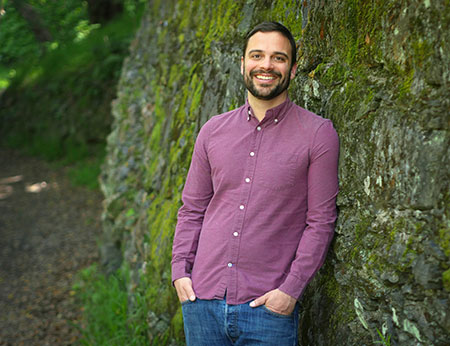Books
Personality
Author Talk: Michael David Lukas

Author Michael David Lukas blends fact and fiction in a richly evocative tapestry that spans 1,000 years in three interconnected narratives. The themes of stewardship, forbidden love and the relationship between Cairo’s Jews and Muslims permeate this year’s Harold U. Ribalow Award winner, The Last Watchman of Old Cairo. (Read an excerpt from that book here.)
His second book—his first was The Oracle of Stamboul—has already won the National Jewish Book Award, the Sami Rohr Prize for Jewish Literature and the American Library Association’s Sophie Brody Award. Lukas teaches at San Francisco State University. This interview is edited for brevity and clarity.
What is your personal connection to Judaism and/or Islam?
I’m Jewish, and my Christian-raised dad converted when he married my mom. My experience is probably more common than the character Joseph having a Jewish mom and Muslim dad. I’ve always been interested in that particular parentage. Because of the matrilineal descent in Judaism and the patrilineal descent in Islam, you can be officially recognized as a Jew and as a Muslim at once. I wanted to play with what it would be like if he were fully inhabiting both religious backgrounds. My connection to Islam and the Arab world in general comes from having lived in Cairo for a while and having studied Arabic and Hebrew in college.

There were two big inspirational moments. I couldn’t square my Jewish identity with my love for Cairo until one day I found myself wandering around Old Cairo. I came upon a graveyard and I noticed some Jewish names and Stars of David. It was connected to this synagogue, and I overheard a tour guide talking about Jewish history in Cairo. That was a revelatory moment for me. Years later, on a cross-country flight, I happened to sit next to this very sweet, very talkative middle-aged Bengali woman, who told me her entire life story; her distant cousins, Muslims, were watchmen of two synagogues in the Indian city of Kolkata, formerly known as Calcutta. There are very few “aha” moments in my writing, but this was one. I tactfully excused myself to go to the bathroom, got one of those little napkins and started scribbling the outline of the book.
How true to life are Agnes Lewis and Margaret Gibson, the two British sisters who helped protect the geniza at the Ibn Ezra Synagogue?
I may have emphasized their role a bit more than a historian would, but the section is told from their perspective. They were top-flight scholars of Semitic languages at a time when women couldn’t even take classes. They had to pay professors to tutor them. Everyone in the book exists both inside and outside power structures. The sisters are British in Cairo, but being women, being millionaires, being older…everything about them is complex and rich. I basically had them created for me.
What is your next project about?
My next book is a retelling and reimagining of the Book of Esther, set in a semi-post-apocalyptic future.
Joanne Sydney Lessner is an author and librettist of the musical ‘Einstein’s Dreams,’ currently running Off Broadway.








 Facebook
Facebook Instagram
Instagram Twitter
Twitter
Jacquie Herz says
Congratulations! I loved your novel.